The beauty of the Mediterranean diet is that it is not a diet, but the principles of a balanced diet.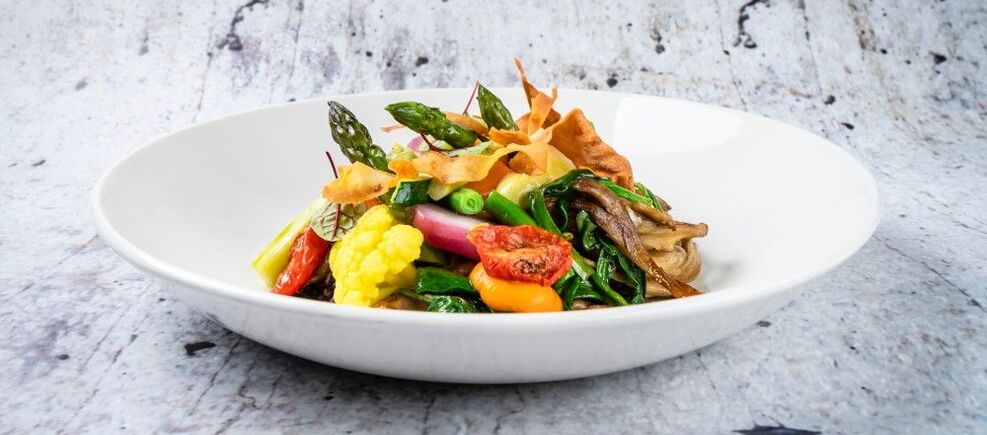 As a rule, almost any diet implies severe restrictions, it is desirable to carry out under the supervision of a physician, and there are contraindications. The Mediterranean diet is suitable for everyone, including children, pregnant women and the elderly. Even if you are allergic or intolerant to certain foods, they are easily replaced by others. You will not be hungry and stressed. On the contrary, you will enjoy your food extremely much. Not in vain the inhabitants of these regions have excellent health and cheerful condition.
As a rule, almost any diet implies severe restrictions, it is desirable to carry out under the supervision of a physician, and there are contraindications. The Mediterranean diet is suitable for everyone, including children, pregnant women and the elderly. Even if you are allergic or intolerant to certain foods, they are easily replaced by others. You will not be hungry and stressed. On the contrary, you will enjoy your food extremely much. Not in vain the inhabitants of these regions have excellent health and cheerful condition.
The Mediterranean diet is a lifestyle that allows you to be in shape, rarely get sick and prolong youth. Thinking about adjusting your diet to the right food, study the principles of the Mediterranean diet.
In 2010, the Mediterranean diet received the official status of UNESCO as the inviolable heritage of the Mediterranean countries: Greece, France, Italy, Morocco, Spain, Croatia, Cyprus, Portugal.
If we turn to history, we can see that in the gastronomic culture of Ancient Greece, and later of Ancient Rome, all the main ingredients of this diet already existed. Lots of vegetables and fruits, seafood, olive oil, legumes, limited amounts of meat and sweets. That is, plant foods rich in vitamins, minerals and fiber, high quality protein, healthy fats and slow carbohydrates. They activate metabolism, improve digestion, strengthen all functional systems of the body, thanks to antioxidants, slow down the aging process, increase the production of joy hormones, promote beauty and harmony. But the most important thing is that they always allow themselves to feel good. But vegetarianism in the Mediterranean countries is not very common, while there are practically no dishes made of red meat, as well as extremely heavy ones.
Scientists from the Harvard School of Public Health researched the health effects of the Mediterranean diet and concluded that "Mediterranean dietary traditions, regular exercise and smoking cessation can prevent more than 80% of coronary heart disease, 70% ofstrokes and 90% of type 2 diabetes ".
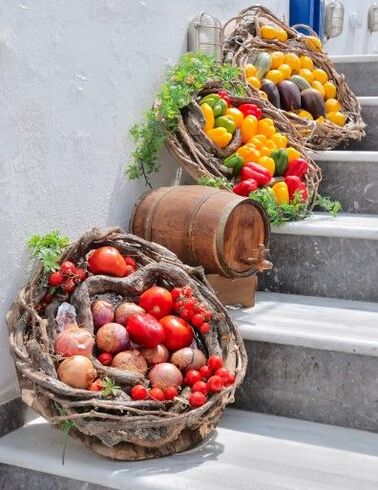
The term itself appeared in the 1950s, it was introduced by a physician, professor at the University of Minnesota Ansel Keys. In 1945, he landed in Italy with a group of American soldiers. Observing the natives, Keys found that they were less likely to suffer from problems with the cardiovascular system and they had a longer life expectancy than in his hometown. He suggested, and then proved, that this is the result of a lifestyle and nutrition system. A little earlier, in the late 1930s, the Italian nutritionist Lorenzo Piroddi first linked food and susceptibility to diseases such as diabetes, overweight and bulimia, hence he is called the "father" of the Mediterranean diet. And Ansel Keys stayed on the coast in Italy and lived 100 years.
Let’s list the pros of a Mediterranean diet.
Strengthens the cardiovascular system. Omega fatty acids from olive oil, nuts, seeds, certain types of vegetables and fruits keep blood vessels clean and elastic.
Prevents or treats diabetes, as the diet is dominated by foods with low glycemic index and almost no sugar is used, which means fast carbs.
Fiber-rich foods are included in every meal, they guarantee a good metabolism, help to lose weight properly and maintain positive dynamics over time, improves the state of the nervous system, improves mood and stimulates brain activity.
Many foods in the Mediterranean diet promote the synthesis of endorphins, dopamine, serotonin and tryptophan, the so-called happiness hormones. This reduces the risk of developing Parkinson's disease, Alzheimer's and dementia in older age.
Chatting with friends, long Sunday dinners with family, outdoor picnics, cooking together are all part of the culture of Mediterranean countries, which is helpful to incorporate into daily life in order to minimize stress levels andanxiety and strengthen positivity.
Prolongs youth and beauty thanks to flavonoids and antioxidants. They reduce damage from the oxidative process, which worsens the internal and external condition. Selenium, manganese, zinc, vitamins A and E make skin strong, and hair shiny and thick.
There is virtually no weakness in the Mediterranean diet.
This helps you switch to the right nutrition and improve your health. It is not seasonal, it is not limited in time and it means a varied menu. Its only drawback is the inability to lose weight fast.
However, in fact, it turns into a plus. Dramatic weight loss is often traumatic for the body: from a sharp change in diet, a tangible loss of normal daily calorie intake, we experience stress. The body responds with poor health, a decrease in strength, immunity and mood, chronic diseases worsen or new ones appear if the diet is uncontrolled.
Yes, for a while the weight disappears quickly, but the brain ignites the way of protection from possible hunger, even from low-calorie food the body manages to store fat in reserve. Therefore, more often after completing the diet, the weight returns, and sometimes even increases.
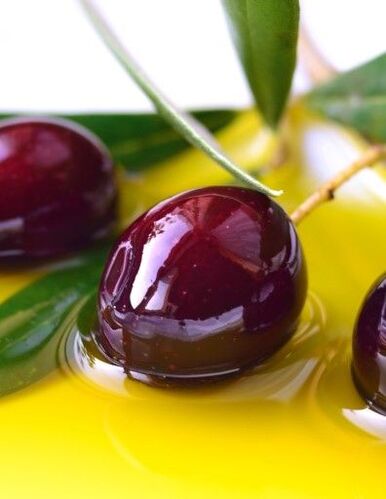
This will not happen with the Mediterranean diet. You will not see rapid change, but be patient. You will notice the first results within two months. You should eat five times a day in small portions - so you will not feel hungry and your body will get the full range of nutrients it needs. Gradually, a rational diet will resume the body’s functional systems, metabolism will improve and weight will return to normal. Add physical activity, at least long walks, and the effect will be noticeable.
The list of approved products is extensive. Nutritionists have identified them in a pyramid based on sources (60%) of high quality complex carbohydrates, fats and vegetables. The former include cereals, whole wheat pasta, whole grain breads, nuts and seeds, and legumes. Products of this group should be included in the menu every day.
Vegetables come in all varieties. Look especially for leafy vegetables like spinach and kale, and vegetables with a minimum of starch like eggplant and zucchini, cauliflower and broccoli, tomatoes, peppers and dill. The WHO recommended a daily intake of vegetables - 6 servings per day - based on the amount of vegetables in the Mediterranean diet.
Previously, when there was no modern technology for storing vegetables, cooking was based on the principle of seasonality. Sadly, in our conditions, seasonal vegetables are a short-lived pleasure. There is a solution: use frozen vegetables. Unlike imported ones, shock freezing, carried out in a few hours after harvest at the peak of maturity, stores almost all the vitamins in them. In winter and spring, the freshness of vegetables is a rather arbitrary concept. Manufacturers consider long-distance travel and storage, for which they treat them with chemicals.
Chives, lentils and beans contain complete plant proteins, a rich nutritional complex and fiber. They saturate well and create the feeling of satiety for a long time. Combined with legumes, a large variety of balanced foods can be prepared. Thick and rich soups will keep you warm in cold weather, and salads are a great option for dinner. Try eating vegetables and legumes for dinner two to three times a week.
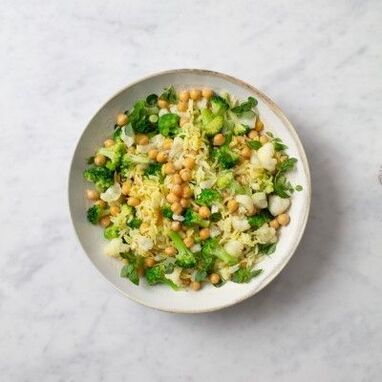
Jasmine rice with chickpeas, mini broccoli, mini cauliflower and truffle oil
Ingredients:
- Qiqra (qiqra) Bonduelle 1 can (310 g).
- Mini broccoli Bonduelle 1 pack (300 g).
- Cauliflower mini Bonduelle 1 pack (300 g).
- Jasmine rice 200 g.
- Basil 40 g.
- Kerri 1 tsp
- Olive oil 20 ml.
- Salt to taste.
Recipe:
- Cook the rice according to the instructions. Add curry, mix.
- Heat the olive oil in a pan and lightly sauté the cabbage and broccoli.
- Combine cabbage, chickpeas and rice, stir. Salt if necessary. Garnish with basil leaves before serving.
Pasta is not bad if made from solid flour: it is low in calories, has a rich content of vitamins and minerals and is easily digested. In addition, pasta, like cereals, is one of the main sources of B vitamins. Pasta made from unrefined flour gives the body energy, for example, it is recommended to eat them before physical activity.
Of course, all the benefits can be canceled if you accompany the dish with a fat sauce or serve as a side dish to meat - such a service has nothing to do with Mediterranean traditions. Light sauces based on olive oil, vegetables, fish and seafood will be the right choice for pasta.
Spaghetti with mini broccoli and pine nuts
Ingredients:
- Pack of broccoli (300 g).
- Spaghetti 250 g.
- Pine nuts 40 g.
- Olive oil 20 ml.
- Ricotta 100 g.
- Salt to taste.
Recipe:
- Cook the spaghetti until cooked through.
- Boil the broccoli according to the instructions.
- Crush 100 g of broccoli with a blender. Mix with ricotta and olive oil.
- Pour the remaining spaghetti and broccoli sauce, season with salt and heat in a saucepan over low heat for 2 minutes.
- Fry the pine nuts in a dry pan and sprinkle them with spaghetti before serving.
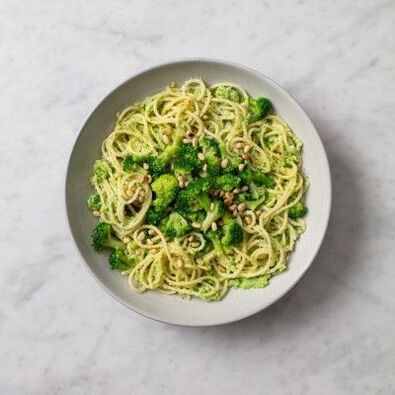
Olive oil, the alpha and omega of the Mediterranean diet, is the gastronomic symbol of this area. Olives began to be consumed here thousands of years ago. Untreated, they taste very bitter, so they were salted or squeezed out of oil.
The reason for this is the substance oleuropein, a phenolic compound that, along with omega fatty acids and vitamin E, determines the benefits of olives. Phenols are powerful antioxidants, have antibacterial and anti-inflammatory properties and fight free radicals. Scientists have found that 2-4 tablespoons of olive oil per day significantly reduces the risk of coronary heart disease.
I met a mention of vitamin F, do not be surprised. Many people do not know that essential fatty acids have a common name - vitamin F. These are archidonic, linoleic and linolenic acids. The human body does not produce them and only accepts them with food.
But remember that not all olive oil is created equal. The best is extra virgin, a cold pressed oil produced by mechanical means. Its acidity, ie the content of organic acids, does not exceed 0. 8%. During the production process, such an oil fully retains vitamins and antioxidants; it should be stored in dark glass bottles at room temperature. It should not be treated with heat.
Add olives yourself everywhere: in salads, soups, main dishes, pies, toast or in an omelette. Olives have a salty taste; with them, the dishes do not require extra salt, which will reduce the amount of salt consumed. Seek inspiration in our selection of olive recipes.
The second step of the pyramid are accurate protein sources, which is 30% in the Mediterranean diet. Part of the body gets protein from plant foods, most fish and seafood, natural yogurt, cottage cheese, low-fat cheeses (goat cheeses and sheep's milk are especially popular), white meat (chicken), turkey, rabbit) and eggs. Foods in this group should be eaten three to four times a week.
Fish should be eaten not only on Thursdays, as bequeathed to the Book of delicious and healthy food, but several times a week. If you choose between river and sea, choose second and fatty varieties. With it, you will get not only protein, but also Omega 3 acids, iodine, which is rarely found in foods, and an excellent complex of vitamins: vitamins A, E, D, C, B. dense fiber structuremuscular. Therefore, they immediately begin to digest, which makes fish an ideal dietary product.
Talking about fish often leads to complaints that it is expensive and that it is almost impossible to buy good fish. Let us clarify these exciting questions.
Indeed, few people manage to buy freshly caught fish. In this case, as with vegetables, do not be afraid to freeze deeply. Observe the rules of thawing: on the bottom shelf of the refrigerator, which will last 10-12 hours and store all the nutrients. Again, as with vegetables, when buying, pay attention that there are no ice crystals on the packaging. They are evidence that the fish has been stored incorrectly: the temperature regime has not been observed. Do not even freeze the fish yourself.
Fish in all countries is an expensive product, but even here there is a way out. You can not afford salmon or tuna fillets, buy more affordable varieties: cod, mackerel, pink salmon, herring, halibut, candlestick, sauri, sardines. In principle, in Mediterranean countries, most families cook from these types of fish, the dishes with them are very tasty and varied. Many people ignore canned tuna, but in vain: it is much more budget-friendly than fresh and just as healthy if it is not made in oil, but in its own juice. Cooking salads with it is a pleasure: no need to bother with cutting.
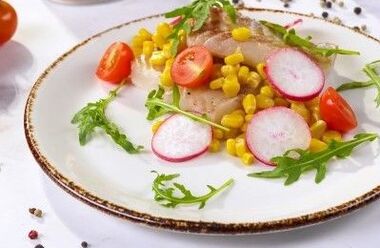
Cod fillet with corn
Ingredients:
- Fresh Corn Bonduelle 1/3 can (140 g).
- Cod fillet 200 g.
- Radish 2 pieces.
- Cherry tomatoes 5 pieces.
- Lemon juice 2 pinches.
- Lemon juice 1 tablespoon
- Any greens to taste.
- Rucola for serving.
- Salt and pepper to taste.
Recipe:
- Dry the cod fillets, remove the bones with tweezers and place the fish in a baking dish. Then lightly sprinkle with lemon juice, rub with a mixture of salt and pepper spices and lemon peel. Bake in the oven at 180 degrees for 15-25 minutes depending on the size of the fillet.
- Cut the cherry in half, cut the radish into slices. Cut the herbs.
- Place the cooked cod fillet on a serving platter. Place next to a garnish of corn, tomatoes, radish and herbs. Garnish with arugula.
The same goes for seafood: we will not target lobsters, seashells and lobsters, but let’s take a closer look at mussels and shrimp. Iodine, selenium, zinc, iron, copper, magnesium - this is not a complete list of minerals they contain, plus low calorie content. Shrimp are rich in vitamin B12 - it participates in the production of hemoglobin and in mussels - vitamin E, which protects cell membranes from destruction.
The last 10% includes red meat, which is recommended to be eaten no more than once a week, animal fats and simple carbohydrates. Try to cook the meat in a gentle way - stew or bake, and fry it without oil, on the grill. Without cakes, life is deprived of sweet joy, but still choose healthy cakes. Use a minimum of sugar, the natural sweetness of fruits, honey and even vegetables is enough. For example, fresh corn is sweet in itself, the cakes with it are delicious and original, and you can also eat it directly from cans.

Fruit salad with fresh corn
Ingredients:
- Fresh Corn Bonduelle 1 can (340 g).
- Blueberries 70 g.
- Strawberries 70 g.
- Raspberry 70 g.
- Orange 1 piece.
- Walnut 80 g.
- Natural yogurt 400 ml.
Recipe:
- Peel a squash, grate it and squeeze the juice. Cut the orange into slices.
- Drain the can of corn. Stir in the corn and berries.
- Chop the nuts and add to the yogurt, stir.
- Put fresh corn fruit salad in small bowls, add yogurt with nuts. Serve with an orange slice.
Finally, a few words about spices.
The aromas of sunny heat and Mediterranean gardens contain rosemary, sage, thyme, basil. Parsley and garlic are the simplest and most affordable spices used by the region’s chefs for centuries. A mixture of aromas of spices, Provencal or Italian herbs will fill the dishes with meaning and interesting nuances. In addition, they will allow you to use less salt - the spice shine is enough for a full flavor.

There are practically no forbidden foods in the Mediterranean diet and their list coincides with that given by all nutritionists. This is fast food and any "junk" food, semi-finished industrial products, sauces, cakes with preservatives and flavor enhancers.
Drink plenty of water, do not neglect a glass of dry red wine (but no more! ) And be healthy!














































































